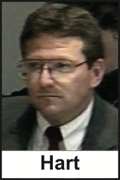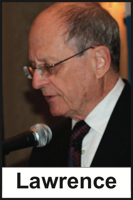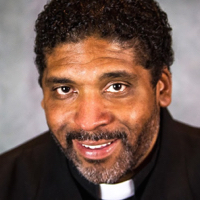Rascals case in brief
In the beginning, in 1989, more than 90 children at the Little Rascals Day Care Center in Edenton, North Carolina, accused a total of 20 adults with 429 instances of sexual abuse over a three-year period. It may have all begun with one parent’s complaint about punishment given her child.
Among the alleged perpetrators: the sheriff and mayor. But prosecutors would charge only Robin Byrum, Darlene Harris, Elizabeth “Betsy” Kelly, Robert “Bob” Kelly, Willard Scott Privott, Shelley Stone and Dawn Wilson – the Edenton 7.
Along with sodomy and beatings, allegations included a baby killed with a handgun, a child being hung upside down from a tree and being set on fire and countless other fantastic incidents involving spaceships, hot air balloons, pirate ships and trained sharks.
By the time prosecutors dropped the last charges in 1997, Little Rascals had become North Carolina’s longest and most costly criminal trial. Prosecutors kept defendants jailed in hopes at least one would turn against their supposed co-conspirators. Remarkably, none did. Another shameful record: Five defendants had to wait longer to face their accusers in court than anyone else in North Carolina history.
Between 1991 and 1997, Ofra Bikel produced three extraordinary episodes on the Little Rascals case for the PBS series “Frontline.” Although “Innocence Lost” did not deter prosecutors, it exposed their tactics and fostered nationwide skepticism and dismay.
With each passing year, the absurdity of the Little Rascals charges has become more obvious. But no admission of error has ever come from prosecutors, police, interviewers or parents. This site is devoted to the issues raised by this case.
On Facebook
Click for earlier Facebook posts archived on this site
Click to go to
Today’s random selection from the Little Rascals Day Care archives….
Click for earlier Facebook posts archived on this site
Click to go to
Today’s random selection from the Little Rascals Day Care archives….
How Bill Hart got better at playing dirty
Dec. 2, 2011
 “Videotaped interviews made during the early cases (alleging day care ritual sex abuse) show that when children were allowed to speak freely, either they had nothing to say about abuse or they denied it ever happened to them.
“Videotaped interviews made during the early cases (alleging day care ritual sex abuse) show that when children were allowed to speak freely, either they had nothing to say about abuse or they denied it ever happened to them.
“Once it became obvious that these records would prevent guilty verdicts, prosecutors began advising investigators not to keep tapes or detailed notes of their work.”
– From “Satan’s Silence: Ritual Abuse and the Making of a Modern American Witch Hunt” by Debbie Nathan and Michael Snedeker (1995)
Perhaps the most significant difference in the two largest abuse trials was that McMartin defense attorneys were able to expose to jurors the prosecution therapists’ manipulative interview techniques, while Little Rascals attorneys were stymied by the premeditated unavailability of original documentation.
“After Bob Kelly’s indictment,” according to an article in the ABA Journal, “Bill Hart, a North Carolina deputy attorney general assigned to the case, traveled to Los Angeles to consult with McMartin prosecutors.
“He learned that McMartin jurors had criticized videotapes of therapist Kee McFarlane’s interviews with the children. She asked leading questions and rebuked children who did not tell of abuse….”
Hart could have brought back to North Carolina the lesson that interviewers shouldn’t “(ask) leading questions and (rebuke) children who did not tell of abuse.” Instead, he brought back the lesson that interviewers should leave no evidence of having used exactly those fraudulent techniques.
For witch hunts, it’s location location location
Dec. 14, 2011
Among the leaders of the Committee for Support of the Edenton Seven was Doug Wiik, whose own Breezy Point Day School in Bucks County, Pennsylvania, had just been cleared of similar abuse accusations. I asked him to compare the two cases.
“I remember that Barbara Fleischman, a dear friend who had moved to North Carolina from Bucks County, called to let me know that the child abuse contagion had reared its head in Edenton.
“Having been deeply affected by my personal experience, I felt the need to reach out. I read about Raymond Lawrence’s formation of the Edenton Seven committee, and after several discussions with him and Dee Swain (a fuel dealer in Washington, N.C.) I was truly inspired to do what I could. I was gratified to find individuals who would fight the injustice being perpetrated upon the Kellys.
 “The eventual outcome in Little Rascals was the correct one, but the damage done to many individuals was enormous. We all have a list of heroes in our lives, and Bob Kelly and Dawn Wilson certainly were added to mine. Both stood firm in speaking truth to a community that lacked leadership in politics and law enforcement….
“The eventual outcome in Little Rascals was the correct one, but the damage done to many individuals was enormous. We all have a list of heroes in our lives, and Bob Kelly and Dawn Wilson certainly were added to mine. Both stood firm in speaking truth to a community that lacked leadership in politics and law enforcement….
“The Edenton case and my own were just two of many produced by the 1980s culture. It happened in Salem 300 years ago, and it will happen again some day.
“So why did my child care business survive, when so many others didn’t?
“We had the exact same claims of horrors perpetrated against children. We had the same media coverage that initially proclaimed ʻChildren don’t lie.ʼ We had the same overzealous child abuse investigators from the county Department of Children and Youth Services. We had the identical mass hysteria.
“But we also had leadership! District Attorney Alan Rubenstein was a seeker of justice, not political gain. He conducted a long, expensive criminal investigation, one that branded the parents’ and children’s claims as false and reckless.
“I’d also be remiss if I didn’t mention my employees and our parent community, who all knew nothing had happened at Breezy Point. They went on camera, wrote letters to editors and participated in several large meetings answering all questions about our school.
“My experience lasted five or six years, caused lots of heartache and did much financial damage. However, Breezy Point Day School still opens at 7 a.m. and closes at 6 p.m. every day and is still filled with several hundred happy children, parents and staff.
“It’s a shame Bob and Betsy Kelly chose Edenton, North Carolina, to open a child care business and not Bucks County, Pennsylvania.”
● ● ●
Later this week I’ll post excerpts from the DA’s 1990 investigative report, along with a few of his recollections (he’s now a judge).
Chaplain writes memoir about supporting defendants
Nov. 21, 2011
 Raymond Lawrence, the New York City chaplain who founded the Committee for Support of the Edenton Seven, was an attentive and often appalled observer at Bob Kelly’s trial. This passage is excerpted from a memoir now posted in its entirety on the Bookshelf:
Raymond Lawrence, the New York City chaplain who founded the Committee for Support of the Edenton Seven, was an attentive and often appalled observer at Bob Kelly’s trial. This passage is excerpted from a memoir now posted in its entirety on the Bookshelf:
“Among the more obscene performances I witnessed by the prosecution was a long argument that Robert Kelly had had vaginal intercourse with a five-year-old girl.
“On a screen about four feet square the prosecutor displayed a color slide the girl’s genitalia, with two adult thumbs shown pulling back the labia to display the hymen and vaginal opening. The hymen appeared fully intact, covering most of the vaginal opening. The prosecutor thus spent what I recall as hours arguing that the stretch marks in the hymen were evidence of adult penile penetration.
“I wondered why the defense attorney did not rise up and ask if this were Alice in Wonderland…. It was as if I had entered an alternate universe.”
Which candidate cares about wrongful convictions?

naacpnc.org
Rev. William Barber
April 8, 2016
“North Carolina’s attorney general (Roy Cooper) should set up a group to investigate claims of wrongful convictions to prevent more innocent people from being in prison, the head of the state NAACP said Thursday.
“The Rev. William Barber also called on Gov. Pat McCrory to establish a task force to recommend ways to strengthen protections against wrongful convictions….”
“Cooper’s office said a meeting was held with Barber and representatives of the NAACP: ‘We look forward to working with them to address systemic issues in the criminal justice system.” Cooper also wants more money for N.C. Innocence Inquiry Commission, which has been involved in releasing eight innocent men.
“McCrory’s office didn’t… respond to Barber’s comments….”
– From “NAACP: Attorney General should review wrongful convictions” by Martha Waggoner of the Associated Press (March 24) (text cache)
The latest addition to the long list of questionable North Carolina convictions comes from Gaston County (thank you, Elizabeth Leland of the Charlotte Observer). Least surprising sentence in Leland’s series: “The prosecutors who tried the case declined to be interviewed.”
![]()











0 CommentsComment on Facebook